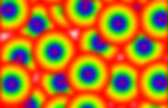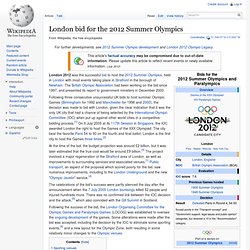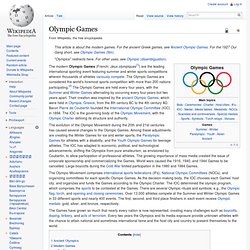

London 2012 Olympic mascots: Meet Wenlock and Mandeville. By Beth Hale Updated: 09:45 GMT, 20 May 2010 They only have one pair of eyes between them and look like Sonic the Hedgehog crossed with a character from the Disney film Monsters Inc.

But you had better get used to these strange blob-like creatures because Wenlock and Mandeville, as they are known, are the mascots for the 2012 Olympics and Paralympics respectively, and will be all over Britain for the next two years. Following the ridicule over the £400,000 Olympic logo, their creators will be hoping that Wenlock and Mandeville get a more favourable reception - even though they too carry the much-mocked 2012 image.
Blobs: Wenlock, named after the Shropshire town, and Mandeville after the hospital are the 2012 London Olympics mascots New mascots: The Olympic mascot Wenlock, left, and the Paralympic mascot Mandeville are unveiled in East London today. Mayor of London Boris Johnson said they were a 'solid coalition', adding: 'It's hard to imagine a mascot more in tune with the times.' London bid for the 2012 Summer Olympics. London 2012 was the successful bid to host the 2012 Summer Olympics, held in London with most events taking place in Stratford in the borough of Newham.

The British Olympic Association had been working on the bid since 1997, and presented its report to government ministers in December 2000. Following three consecutive unsuccessful UK bids to host summer Olympic Games (Birmingham for 1992 and Manchester for 1996 and 2000), the decision was made to bid with London, given the clear indication that it was the only UK city that had a chance of being selected by the International Olympic Committee (IOC) when put up against other world cities in a competitive bidding process.[1] On 6 July 2005 at its 117th Session in Singapore, the IOC awarded London the right to host the Games of the XXX Olympiad. The city beat the favorite Paris 54 to 50 on the fourth and final ballot. London is the first city to host the Games three times.[2] Sporting venues[edit] Olympic Zone[edit] River Zone[edit]
Www.rgs.org/NR/rdonlyres/1E506FE2-3179-439C-81F2-B43D0B97D058/0/CGT_NetRaising_8Olympicpresentation.pdf. World's biggest McDonald's: First pictures inside Olympic Stadium fast food restaurant. By Louise Eccles Published: 17:15 GMT, 25 June 2012 | Updated: 18:08 GMT, 3 July 2012 When the Olympic Games begin in London next month, the capital will play host to the fittest, fastest and strongest athletes in the world.

But it will also be home to a rather different superlative – the biggest McDonald’s on the planet, right in the middle of the Olympic park. So while the competitors stretch themselves to their very limits, hungry spectators will gorge on tens of thousands of burgers and portions of fries. Scroll down for video inside the world's biggest McDonalds Bigger Mac: An exterior view of the world's largest McDonald's restaurant, their flagship outlet in the Olympic Park Cavernous: Staff assemble a banner inside the world's largest McDonald's restaurant, which has seating for 1,500 customers The vast two-storey restaurant will serve up to 1,200 customers an hour and sell £3million of fast food during the Games.
Olympic Games. The modern Olympic Games (French: Jeux olympiques[1]) are the leading international sporting event featuring summer and winter sports competitions wherein thousands of athletes variously compete.

The Olympic Games are considered the world's foremost sports competition with more than 200 nations participating.[2] The Olympic Games are held every four years, with the Summer and Winter Games alternating by occurring every four years but two years apart. Their creation was inspired by the ancient Olympic Games, which were held in Olympia, Greece, from the 8th century BC to the 4th century AD. Baron Pierre de Coubertin founded the International Olympic Committee (IOC) in 1894. The IOC is the governing body of the Olympic Movement, with the Olympic Charter defining its structure and authority. The evolution of the Olympic Movement during the 20th and 21st centuries has caused several changes to the Olympic Games. Ancient Olympics Modern Games Forerunners Revival 1896 Games Changes and adaptations.